Verifying your Business in Australia
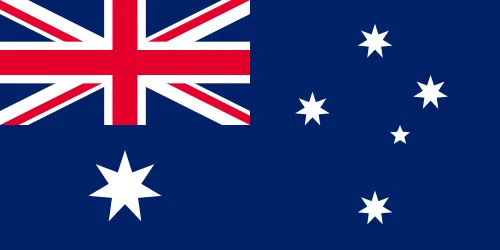
This article outlines the documents required for organizations registered in Australia to complete business verification.
Verification, commonly referred to as KYC or "Know Your Customer," is a regulatory requirement for offering financial services to businesses and individuals. The process involves collecting, reviewing, and maintaining information about the entities and individuals using our services.
The verification process is divided into two primary components: Business Verification (Verifying the nature and ownership of the business) and Individual Verification.
Topics covered here, include:
- Verifying the nature of your business
- Verifying ownership
- Verifying individuals
- Additional requirements
- Document requirements
Verifying the Nature of your Business
The Nature of business must be verified to ensure it aligns with regulatory requirements, accurately reflects its stated operations, and complies with industry and legal standards. Evidence of business activities may include, your Website.
If your company does not have a working website, please provide one of the below:
- Contracts
- Business agreements
Or, a combination of the following:
- Company profile or presentation / company brochures or marketing material / detailed business plan
- Invoice (document must be issued within 1 year, and must clearly showcase business operations)
Prohibited Business Categories
If your company’s industry falls under any one of the listed categories, the application may be either rejected, or additional documents may be requested.
Prohibited and Restricted Business Categories
Verifying Ownership
To identify a business entity in Australia, it is required to have an active and current ABN.
Documents that may be required for different company types:
| Entity Type | Required Document |
| Private Limited | - |
| Listed Public | - |
| Unlisted Public | - |
| Partnership | Partnership agreement |
| Association | Governance Structure |
| Trust / Trustee | - |
| Sole Proprietor | - |
For Multi-layer ownership structure companies, see section Multi-layer ownership structure
Verifying Individuals
| Entity Type | Applicant | One of the Directors | Ultimate Beneficial Owners | Appointor | Additional authorized signatories | One of the Partners | One of the following individuals: Public Officer/ Chairperson/ Vice Chairperson / President / Vice President / Treasurer / Secretary | Sole Owner |
| Private Limited | ✓ | ✓ | ✓ | ✓ | ||||
| Listed Public | ✓ | ✓ | ||||||
| Unlisted Public | ✓ | ✓ | ✓ | |||||
| Partnership | ✓ | ✓ | ||||||
| Association | ✓ | ✓ | ✓ | ✓ | ||||
| Trust / Trustee | ✓ | ✓ |
✓ |
✓ *If Ultimate Beneficial Owners cannot be identified |
✓ | |||
| Sole Proprietor | ✓ | ✓ | ✓ |
See requirements for documents here
Additional requirements
- Letter of Authorization
- Multi-layer ownership structure
- Source of Funds / Source of Wealth
Letter of Authorization
Download Letter of Authorization here
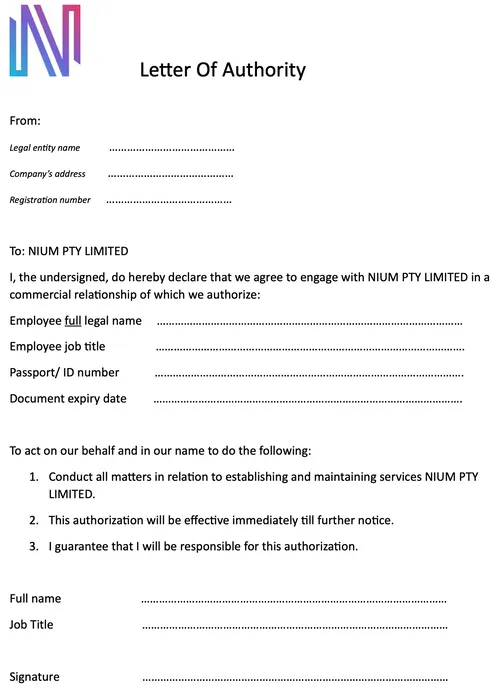
![]()
Authorization for Non-Directors or Non-UBOs
If the onboarding application is being prepared or submitted by individuals who are not Directors or Ultimate Beneficial Owners (UBOs), a Letter of Authorization is required. This form authorizes these individuals to act on behalf of the company. Below are the requirements based on the company type:
| Entity Type | When Required | Who Signs the Document | Document Validity |
| Private Limited | For any individual who is not a Director/UBO | Company Director / UBO | Must be dated within 1 year |
| Listed Public | For any individual who is not a Director | Company Director | Must be dated within 1 year |
| Unlisted Public | For any individual who is not a Director/UBO | Company Director / UBO | Must be dated within 1 year |
| Partnership | For any individual who is not a Partner | Company Partner | Must be dated within 1 year |
| Association | For any individual who is not Chairperson, Vice Chairperson, President, Vice President, Secretary, Public Officer, Treasurer | One of the following members: Chairperson, Vice Chairperson, President, Vice President, Secretary, Public Officer, Treasurer, Board member or Committee member |
|
| Trust / Trustee | For any individual who is not a Director/Beneficiary/Appointor | Company Director/Beneficiary/Appointor | Must be dated within 1 year |
| Sole Proprietor | For any individual who is not the Sole Owner | Sole Owner | Must be dated within 1 year |
Multi-layer Ownership Structure
A multi-layer ownership structure exists when a company is owned indirectly through one or more intermediate entities, rather than being directly owned by individuals or a single organization.
To determine if your company has a multi-layer ownership structure, please refer to the below questions:
- Is your company owned by another entity (e.g., a company, trust, or partnership) rather than directly by individuals?
If yes, there is at least one layer of ownership. - Does that owning entity itself have owners who are other entities?
If yes, this adds another layer to the structure. - Can the ultimate beneficial owners (the individuals who control or benefit from the company) only be identified by tracing ownership through multiple entities?
If yes, your company has a multi-layer ownership structure.
In simpler terms, if you must navigate through several entities to find the ultimate owners or decision-makers, your company likely has a multi-layer ownership structure.
Providing documents for multi-layer ownership structure
Nium prioritizes obtaining documents from reliable and independent sources, such as public registries, to streamline and simplify the onboarding process. Customers are only asked to submit documents themselves when these sources do not provide the necessary information, ensuring efficiency while upholding regulatory compliance.
If the holding companies are incorporated in Australia, the same requirements will apply as listed in section Verifying ownership.
For non-Australian incorporated entities, required documents may include:
- Business registration document / Certificate of Incorporation.
- Register list of Directors and Register list of shareholders (can be same document as number 1 if it holds the same information).
See requirements for documents here
Source of Funds / Source of Wealth
Nium may request a Source of Funds or Source of Wealth document under certain circumstances. This is not a requirement for all customers and is only requested in specific cases. Factors such as the type of business, the nature or industry of business activities, and any elements affecting Nium’s risk assessment may lead to an Enhanced Due Diligence Questionnaire being issued. Please note, this is not applicable to all onboarding cases and is determined on a case-by-case basis.
Download Enhanced Due Diligence Questionnaire here
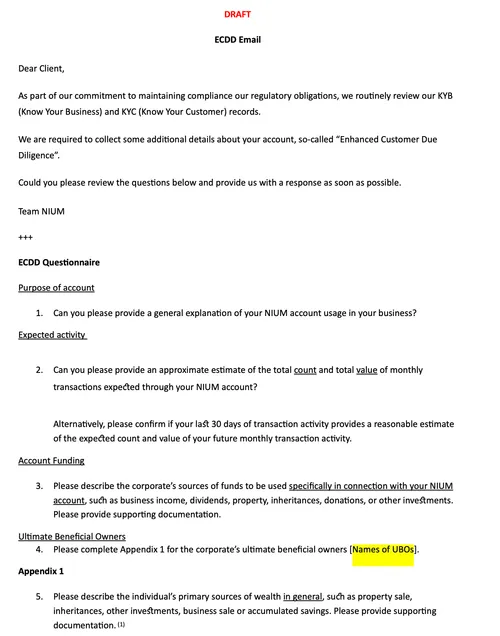
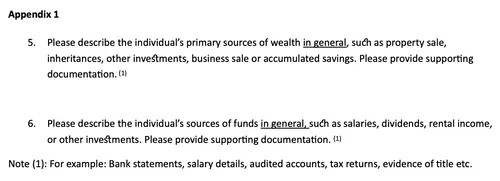
Depending on the company overall evaluation, Nium may request for Source of Funds or Source of Wealth documents. This is not applicable to all onboarding cases.
Source of Funds - the origin of funds that an individual or company uses to finance its operations.
Source of Wealth – origin and means of wealth, reflecting the overall accumulated net worth of entity/individual, used to establish and operate a company. A written explanation, accompanied by supporting documentation, must be collected to confirm the legitimacy of the customer’s wealth for conducting business.
Examples of supporting documentation for Source of Wealth / Source of Funds:
- Personal or joint savings, collected in form of bank statements
- Employment income, including salaries, bonuses, and pension
- Loan agreements
- Contract agreements
- Sale of assets (real estate, shares)
- Inheritances, including family wealth transfer
- Compensation from legal settlements
- Profits from legitimate business activities or investments
- Ownership of businesses or investments, including returns
- Other documents, related to customer’s funds or wealth
Document Requirements
Identity and Address verification
Nium will attempt to verify the individuals using reliable and independent sources. In cases where verification is incomplete, below documents would be required:
- Certified Proof of Identity*
- Certified Proof of Address*
*Certification must be issued within 6 months. Certification is completed by an individual who is authorized to certify copies of original documents. More information can be found here.
Proof of Identity
- Passport
- AU Driver's license (both sides)
- Birth certificate
- Document should be with valid expiry date, good quality, colored copy, all four corners must be visible
- Copy of a copy is not accepted
- Black & white documents are not accepted
Examples of Identity Documents
Passport
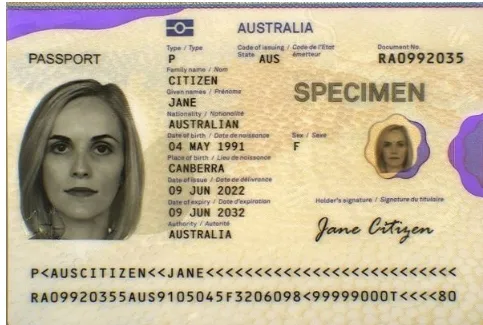
Driver’s License
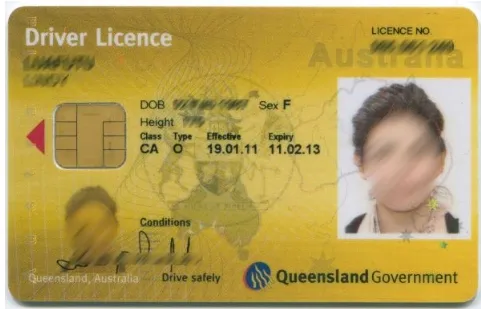
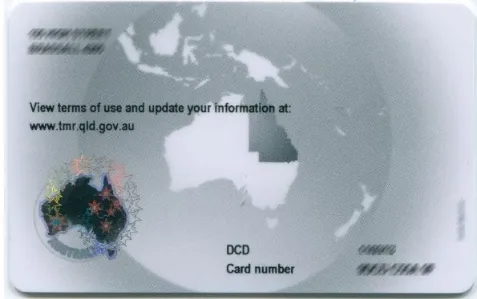
Proof of Address
- Utility bill
- Bank statement
- Rental agreement
- Government issued letter
- Phone bill (landline only)
- Driver’s license
- Document must be dated within 90 days (Not applicable to Driver’s License)
- Cropped documents are not accepted
- Invoices are not accepted
- PO BOX and CMRA addresses are not accepted
Examples of address documents
Utility bill
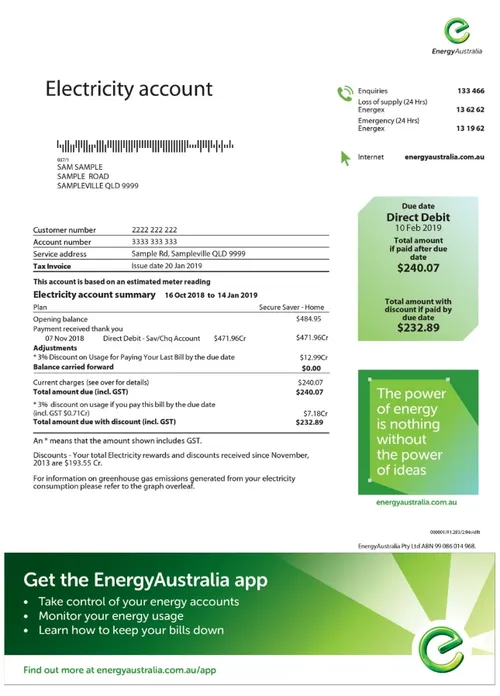
Bank statement
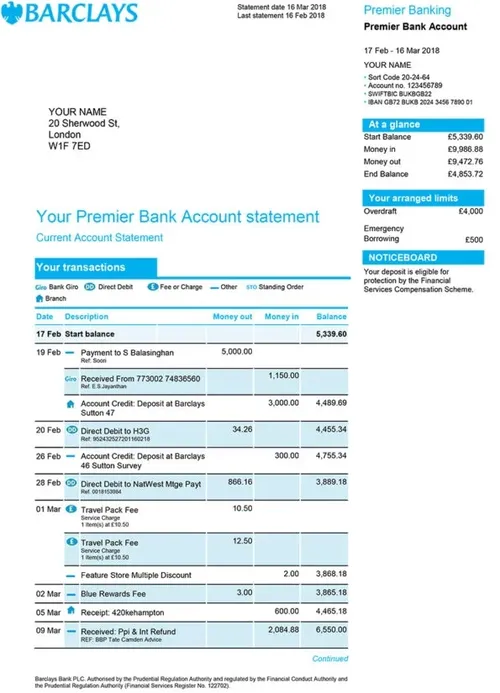
Ownership Document Requirements
Ownership document requirements for non-Australian incorporated entities:
Business registration document / Certificate of Incorporation. Document must include:
- Business name
- Business registration number
- Issuing authority
- Registration date
- Company address
- Issuing country
Register list of Directors and Register list of shareholders. Document must include:
- Business name
- Business registration number
- List of company Directors
- List of company Shareholders, and their holding percentages
- Document must be issued within 6 months
- Document must be dated
- Document must be signed by company Director/UBO